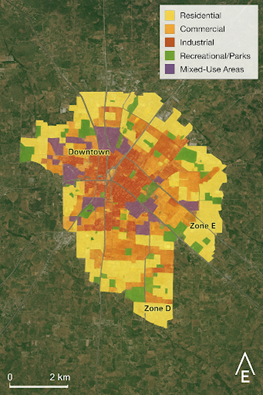Artificial Intelligence for Enhancing Urban Land Use Mix and Functional Diversity: A Data-Driven Approach to Sustainable Mixed-Use Development
Keywords:
Artificial Intelligence, Functional Diversity, Land Use Mix, Mixed-Use Development, OptimizationAbstract
Urban areas are increasingly challenged by functional segregation, uneven land use distribution, and limited accessibility, which reduce urban vitality and sustainability. This study explores the application of Artificial Intelligence (AI) in enhancing urban land use mix and functional diversity, promoting vibrant, walkable, and sustainable neighborhoods. A systematic literature review of 654 studies published between 2014 and 2025 was conducted to identify AI methodologies, urban planning applications, and research gaps. High-resolution spatial data, including Sentinel-2 imagery and GIS layers, were analyzed using machine learning (Random Forest, SVM), deep learning (CNN), and optimization algorithms (GA, PSO). Functional diversity was assessed using Shannon entropy, while accessibility and walkability indices evaluated urban vitality. Results indicate that CNN outperformed traditional machine learning in classifying complex land use types, particularly mixed-use areas, achieving an overall accuracy of 91.5%. AI-based optimization improved functional diversity by 19–21%, increased mixed-use coverage from 21.5% to 30.1%, and enhanced walkability and accessibility scores. Scenario analysis demonstrated that AI-driven urban planning can guide sustainable development, particularly in underutilized and low-diversity areas. The study emphasizes the potential of Explainable AI (XAI) to ensure transparency, interpretability, and equity in AI-driven urban planning decisions. Overall, integrating AI into urban planning processes provides a data-driven, evidence-based framework for creating functional, resilient, and sustainable urban environments.


